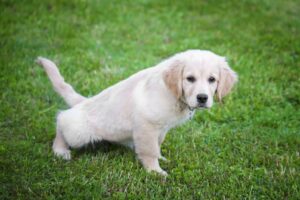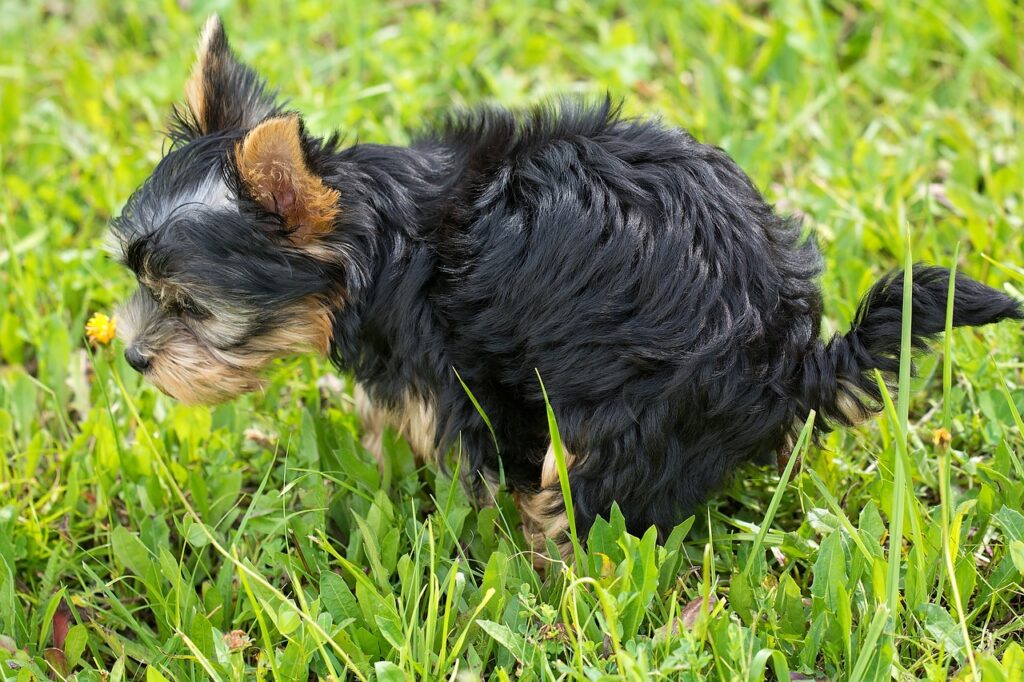Ah, the joys of having a new puppy! You’ve stocked up on chew toys, prepared a cozy sleeping space, and bought a lifetime supply of adorable puppy pics. But then, the dreaded reality hits you: it’s time to potty train your pup, but potty training puppy can’t be easy can it?
Don’t worry, fellow puppy parent! This article will walk you through the wonderful world of potty training a puppy, and you’ll have a well-trained pup in no time.
Table of Contents
The Golden Rule of Potty Training: Patience, Consistency, and Positive Reinforcement
Before we dive into the nitty-gritty of potty training, let’s talk about the three essential ingredients to your puppy-parenting success:
- Patience: Rome wasn’t built in a day, and your puppy won’t be potty-trained in one either. Potty training takes time, so give your pup some wiggle room (pun intended) to learn.
- Consistency: Stick to a routine and don’t confuse your pup with mixed signals. Consistency is key!
- Positive Reinforcement: Reward your puppy with treats, praise, or playtime when they successfully use their potty spot. Positive vibes only!

Now, are you ready for the poop scoop on potty training? (We promise, that’s the last pun… maybe.)
Puppy Potty Training Timeline
Every puppy is different, but here’s a general timeline to help you set realistic expectations for your potty training journey:
- 8-12 weeks: Start potty training as soon as you bring your pup home. At this age, they’ll need to go out every 1-2 hours.
- 12-16 weeks: With consistency and positive reinforcement, your puppy should start to show progress. They can hold their bladder for about 3-4 hours.
- 16-20 weeks: Your puppy may still have occasional accidents, but they should be getting the hang of it. Keep up the good work!
- 5-6 months: Most puppies are fully potty-trained by this age. However, some breeds and individual pups may take longer.
Remember: practice makes perfect (or at least, fewer messes)!
How to Choose the Perfect Potty Spot
Location, location, location! Choosing the right potty spot is essential for a smooth potty training experience. Here are some tips:
- Easy Access: Make sure your puppy can easily get to the potty spot, especially if they’re a tiny breed or have limited mobility.
- Consistency: Once you’ve chosen a spot, stick to it! Your pup will associate the area with their bathroom breaks.
- Safety First: Choose a spot away from busy streets, poisonous plants, or other hazards.
Can’t decide on the perfect spot? Try putting yourself in your pup’s paws (figuratively, of course) and ask yourself: “If I were a puppy, where would I want to go?”
Potty Training Techniques: What’s Your Pup’s Style?
There’s more than one way to potty train a puppy, and what works for one pup might not work for another. Here’s a rundown of popular potty training techniques:
- Crate Training: Using a crate helps teach your pup to hold their bladder when they can’t go outside. Make sure the crate is just big enough for your puppy to stand up, turn around, and lie down comfortably. Remember to let them out for frequent potty breaks!
- Puppy Pads: Place puppy pads in your chosen potty spot for easy cleanup. Gradually move the pad closer to the door or outside as your pup learns to associate the pad with potty time.
- Outdoor Potty Training: Take your puppy outside to their designated potty spot consistently, using a cue like “Go potty!” Reward them when they do their business outside.
Experiment with these techniques to find the one that works best for your pup. And remember, there’s no “one size fits all” when it comes to potty training!
Accidents Happen: Dealing with the Oopsies
No matter how diligent you are, accidents will happen. But don’t fret! Here’s how to handle those little messes with grace and good humor:
- Clean Up Quickly: Use an enzyme-based cleaner to remove the odor and prevent your puppy from being attracted to the same spot in the future.
- Don’t Punish: Punishing your pup for accidents will only create fear and confusion. Instead, calmly clean up and try to figure out what may have caused the accident.
- Learn from Mistakes: Did your puppy have an accident because you missed their cues? Adjust your routine or watch more closely to prevent future mishaps.
As they say, “To err is human, to forgive, canine.” So let’s forgive our pups and move on!
Frequently Asked Questions about Puppy Potty Training
Got questions? We’ve got answers! Here are some common questions puppy parents have about potty training:
- How often should I take my puppy out to potty? Generally, every 1-2 hours for young puppies, gradually increasing the interval as they grow older and can hold their bladder longer.
- How long does it take to potty train a puppy? Most puppies are fully potty-trained by 5-6 months, but some breeds or individual pups may take longer.
- What should I do if my puppy isn’t making progress with potty training? Consider trying a different potty training technique, adjusting your schedule to provide more frequent potty breaks, or consulting with a professional trainer or veterinarian for advice.
- Do you have any advice on, “how to stop my dog from peeing on my bed”? Yes, you can read our comprehensive article, how to stop my dog from peeing on my bed.
Key Takeaways and Conclusion
Congratulations! You’ve made it to the end of our puppy potty training adventure. Here are the key takeaways to remember:
- Practice patience, consistency, and positive reinforcement throughout the potty training process.
- Choose a potty spot that’s safe, easily accessible, and consistent.
- Experiment with different potty training techniques to find the one that works best for your pup.
- Expect and be prepared for accidents, but don’t punish your puppy for them.
- Stay flexible and adjust your approach if needed.
Now, go forth and conquer the world of puppy potty training! With your newfound knowledge, you’ll be a potty training pro in no time.
Good luck, and may the (potty) force be with you!


Dennis and Becca, have always shared a passion for man’s best friend. As dog enthusiasts, they put together articles that inform, engage, and captivate fellow dog lovers.